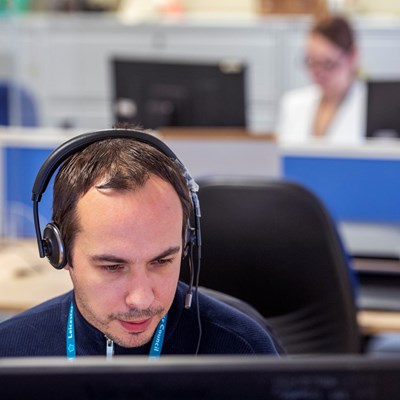LEICESTER City Council’s pioneering contact tracing team for coronavirus infections has successfully tracked down more than 92% of cases in the past three months.
Since 7 December, the city council has been given the responsibility of contacting anyone in Leicester who tests positive for coronavirus, if they fail to respond to an automated message within eight hours. Between then and now*, the team has dealt with 7,197cases, of which 6,664 have been successfully traced, giving a success rate of 92%.
Starting from this week, Public Health England (PHE) has been working to send cases through to the city council’s contact tracing team even more quickly – allowing the local team to access cases as soon as they’re entered onto the national system. Leicester is in a small group of local authorities selected for this latest pilot scheme, which is aimed at making contact tracing as efficient as possible.
Leicester was the first local authority in the country to be given access to this data by Public Health England so that its contact tracing team could respond quickly in this way. Previously, cases would only be referred to the council after the national NHS Test & Trace service had spent up to four days trying to locate them. This led to many cases being passed to the local authority to track down very late in their isolation period.
Now, the team is also conducting follow-up calls to people who need to isolate, to check they are isolating effectively and ask if they need any help. Calls are carried out three days after people are first contacted by the team.
Although coronavirus infections in the city are falling slowly, the number of cases remains high, at 208 infections per 100,000 people. As a recent example, on 24 February alone, 85 cases were passed to the city council’s tracing team. The team must work quickly to track down individuals who have tested positive and gather information about their close contacts before they pass on the virus.
Professor Ivan Browne, director of public health at Leicester City Council, said: “The fact is that Leicester’s coronavirus infection rate remains stubbornly high compared with the national average. Our local contact tracing team is doing great work to help contain this by successfully tracking down 92% of the cases passed to it – but we all need to be doing everything we can to contain the spread.
“Remember: if you test positive for coronavirus, you are breaking the law if you don’t stay at home and self-isolate for 10 days – and it’s your duty to share information about the people you may have infected with the virus. Tracing your contacts, and getting them to self-isolate too, is essential.”
City mayor Peter Soulsby added: “I’m very proud of the work of our contact tracing team, which continues to have a very high success rate. It demonstrates that the most effective way to trace hard-to-reach people who test positive – and stop them from spreading the virus – is to use local teams equipped with local knowledge.
“Without the dedicated work of this team, we would be in a worse position when it comes to tracing people with the virus.”
Of the 85 cases referred to the team on 24 February, 81 have been traced, given guidance about the support that’s available, and asked to self-isolate. Sixty of them (70%) were contacted and had their information relayed back to Public Health England (PHE) within seven hours. Information about their close contacts has been passed back to Public Health England, which is responsible for contact tracing.
People prove difficult to contact for a variety of reasons, including:
- a phone number provided is incorrect
- the infected person is a child, whose parent must be informed
- requests for information about contacts have not been responded to
- a whole family has been tested, but only one member has responded to the contact tracers.
Leicester City Council’s tracing team will attempt to contact individuals remotely – by phone or by email – over a period of 24-48 hours. If this is unsuccessful, members of the ground team, in full PPE, will call at their home address.
The city council’s contact tracers are all council employees who normally work in customer-facing roles, such as in libraries and sports centres. The team also draws on expertise from city council public health officials who have experience in tracking down people in a similar manner to prevent the spread of sexually transmitted diseases.
The team works closely with the local PHE health protection team, which provides expert advice and follows up any issues related to workplaces or other venues where the virus might have spread.
For information and advice, see www.leicester.gov.uk/coronavirus
(ends)
Notes to editors
*Figures given are from 7 December to 25 February inclusive
